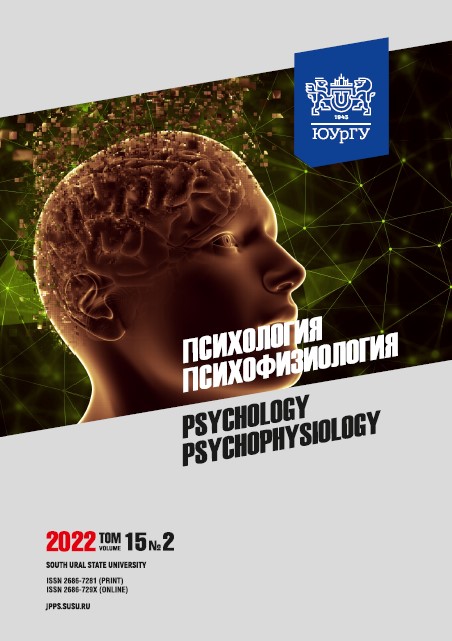Resilience and management factors in education managers of different expe-rience and status: a resource approach
Abstract
Introduction. This paper continues the series of studies on the psychological resources and limitations of education managers. The “resource” concept includes the ability to perform high-quality managerial activities and the prospect for risk-reduction with respect to limitations imposed by the characteristics of the individual. The study of resources/limitations contributes to the development of management culture, introspection skills, and the ability to associate personal ideas with corporate goals and strategies. Aim. The paper aims to verify the idea that managerial resilience and resources/limitations are the components of psychological resources of education managers and depend on their experience and status.
Materials and Methods. The study involved 315 education managers from the Leningrad Region and the Khanty-Mansiysk Autonomous Okrug. The sample was divided based on the institutional level, the scope of functional and managerial responsibilities, and the managerial experience of participants. The Resilience questionnaire (S. Maddy) and the Critical Blockages Survey (M. Woodcock, D. Francis) were used. Statistical processing was performed with dispersion analysis; comparative analysis (Kruskal-Wallis test, Student's T-test), multiple regression analysis. Results. A management factor as a concept was clarified being the ratio of managerial resources and limitations. The relationship between management factors and resilience was found, as well as their features with respect to professional experience and status. Resilience models were built and described with respect to managerial experience. The limitations associated with the methodology of M. Woodcock and D. Francis were found as soon as it was too practice-oriented, with ambiguous terminology and structure. Conclusion. The results obtained show the correlation between management evaluation and activity features. The hypothesis about the effect of resources/limitations and their amount on resilience has been verified, as well as the hypothesis about the integral effect of resources/limitations and resilience, which depends on professional experience.
Downloads
References
2. Maddi S.R. Hardiness as the Existential Courage to Grow Through Searching for Meaning. The Experience of Meaning in Life. Eds. J. Hicks, C. Routledge. New York: Springer. Dordrecht. 2013:227–239. DOI: https://doi.org/10.1007 / 978-94-007-6527-6_18
3. Calvo J.-C.A., García G.M. Hardiness as moderator of the relationship between structural and psychological empowerment on burnout in middle managers // Journal of Occupational and Organizational Psychology. 2018; 91 (2):362–384. DOI: https://doi.org/10.1111/joop.12194
4. Kobasa S.C., Maddi S.R., Kahn S. Hardiness and health: A prospective study. Journal of Personality and Social Psychology. 1982;42(1):168–177. DOI: https://doi.org/10.1037/0022-3514.42.1.168
5. Lichnost professionala v sovremennom mire [The personality of a professional in the modern world]. Eds. L.G. Dikaya, A.L. Zhuravlev. Moscow. 2013:944. (in Russ.).
6. Rylskaya E.A. Persons resilience: category and concepual foundations of investigation. Sibirskii psikhologicheskii zhurnal = Siberian Journal of Psychology. 2009;31:6–11. (in Russ.).
7. Vudkok M., Frensis D. Raskreposhchennyi menedzher. Dlya rukovoditelya – praktika [The liberated manager. For the head – practice]. Moscow. Delo. 1991:320. (in Russ.).
8. Zelinskiy S.E. Diagnostic tools for assessment of civil servants managerial competence. Voprosy upravleniya = Management issues. 2015;6(18):204–210. (in Russ.).
9. Sheverdina T.N., Feshchenko E.M. Investigation of the correlation between management activity effectiveness and emotional resilience of a leader. Kontsept = Koncept. 2017;11:70–78. DOI: https://doi.org/10.24422/MCITO.2017.11.8157. (in Russ.).
10. Morozov A.V. Psychological aspects of the management activity of heads of the education system. Upravlenie obrazovaniem: teoriya i praktika = Education Management Review. 2017;3(27):33–49. (in Russ.).
11. Woodcock M. Team Metrics: resources for measuring and improving team performance. HRD Press. 2008:394.
12. Markina N.V., Pervukhina E. S., Gumnitskiy M.E. et al. Tolerance to uncertainty and self-regulation of leaders of schools with low and high educational results. Vestnik Yuzhno-Uralskogo gosudarstvennogo gumanitarno-pedagogicheskogo universiteta = The Herald of South-Ural state Humanities-Pedagogical University. 2020;6(159):241–265. DOI: https://doi.org/10.25588/ CSPU.2020.159.6.015
13. Baturin N.A., Vyboishchik I.V. Psikhologiya otsenivaniya i otsenki: teoreticheskie i prikladnye aspekty [Psychology of assessment and evaluation: theoretical and applied aspects]. Chelyabinsk: Izdatelskii tsentr YuUrGU. 2011:243.
References on translit
-Copyright (c) 2022 Psychology. Psychophysiology

This work is licensed under a Creative Commons Attribution-NonCommercial-NoDerivatives 4.0 International License.



